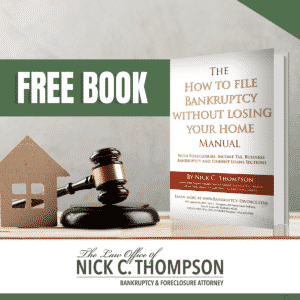Getting Your Chapter 13 Discharge Papers After Finishing a Chapter 13
Without taking the debtor education class and filing the discharge form, you are not completing your Chapter 13 bankruptcy filing and getting a discharge. Once your plan payments are complete, the debtor has to file and request a discharge. This is not automatic. This is done by simply submitting the discharge request form at the bottom of this post and it is best to get it from the court website.
The request for discharge form
The request for discharge is a simple one-page form that states the home address of the debtor and place of employment at the time the case closes. Each district might have a modification of the national form, so get this document from the local court website to get the most up to date version. To get your discharge, you simply have to take the
- debtor education certificate class
- file the certificate from the class
- and advise the court of your last address and job on the discharge request form.
Curing missed mortgage payments and foreclosure.
Just before your case is closed the trustee will normally file a motion asking for an order certifying the mortgage is now up to date. If the mortgage company agrees and certifies the mortgage is up to date the mortgage foreclosure will be cured. Chapter 13 addresses the debts arising prior to filing. Debts incurred after filing or defaults which occur after filing or after the case closes will cause the home to go back into foreclosure. Incur debt after filing and they become part of your repayment process after discharge.
Your Chapter 13 bankruptcy filing included a plan which was very much like a contract. You perform and you get the bankruptcy discharge. But it is possible to modify that bankruptcy filing and Chapter 13 bankruptcy plan. Your Chapter 13 bankruptcy repayment plan can end early. Or if conditions change it can be changed to become more affordable. Credit card debt will rarely object to a modification or early hardship discharge.
Hardship discharge
A Chapter 13 bankruptcy can have a hardship discharge where the repayment plan has not caught up the mortgage but the debtor still gets a bankruptcy discharge of personal loans and unsecured debt. The bankruptcy judge issues the hardship discharge and you still have to complete the debtor education class and request for discharge form.
A Chapter 13 hardship discharge is where the debtor has repaid what a Chapter 7 would have repaid, and through no fault of the debtor leaves the debtor unable to complete plan payments. Do not confuse this with a student loan hardship discharge. Both of the hardship discharges require the debtor to show that completing payment would be an undue hardship. Often the Chapter 13 hardship is for persons who started the repayment plan but became disabled.
The Chapter 13 bankruptcy is discharged but if the mortgage has not been caught up or the priority taxes have not been repaid the debts remain in default. There may be other answers to these secured and priority debts. The debtor has not completed catching up the mortgage or property tax debt and may still have a foreclosure case but there are other answers to student loan, tax and mortgage debt.
Discharging Unsecured debt
Medical Bills, unsecured debts like credit card debt and even income tax debt over 3 years old is dischargeable. Income taxes over three years old is treated no differently than credit card debt. Even if the Chapter 13 repayment plan stated you had to pay a higher percentage the case will still be discharged. If you have a Chapter 13 bankruptcy attorney who knows what he is doing this should go smoothly.
The only main difference between the hardship and normal Chapter 13 bankruptcy discharge is some foreclosures and tax debt may not have been in the Chapter 13 long enough to repay enough to bring them out of default.
Discharging unsecured debt in a Chapter 13 hardship discharge is relaxed. The repayment plan is modified to permit the suddenly disabled person to complete the Chapter 13 bankruptcy after years of payment.
Non-discharged debt
The Chapter 13 discharge does not normally discharge non dischargeable debts. However almost every non dischargeable debt has exceptions. You bankruptcy attorney should have explained that some debts from a willful and malicious injury or fraud is not discharged. However the creditor is required to object to your discharge usually within months after your case is filed or they lose the right to claim being excepted from a Chapter 13 bankruptcy discharge. Alimony, child support payments and debts to the government are not required to file objections under the bankruptcy code.
A qualified bankruptcy attorney who represented a creditor would have objected to a nondischargeable debt. Even a debt which is non-dischargeable can be discharged if the plan and confirmation order states it is to be discharged upon completion of the Chapter 13 bankruptcy.
Forgotten assets in your bankruptcy case.
A personal injury case or inheritance within a year after the discharge are assets you may have forgotten about and which can be used to repay creditors. The bankruptcy estate is the property and income available for repayment. The Debtor’s homestead exemption is not lost in the discharge process even if the plan is modified or if the debtor gets a hardship discharge in the bankruptcy process.
Finishing a Chapter 13 Plan And Getting a Bankruptcy Discharge
The major purpose of the discharge request form is to inform primary custodians where the ex-spouse is employed and resides so child support and alimony can be paid. Alimony and child support are sometimes caught up through Chapter 13. Normally alimony and child support are not affected or paid by the Bankruptcy court but it is possible to catch up alimony or child support in full and pay unsecured creditors less. Once your repayment plan payments are complete, the debtor has to file and request a discharge. Bankruptcy court gives alimony and child support full priority over unsecured and even secured debts. Chapter 13 can be a tool of child support enforcement but it is rarely or almost never used.
 Request for discharge form.
Request for discharge form.
The request for discharge form is required along with the Debtor education certification to get the final discharge order in Chapter 13. Filing the request for discharge form, along with the debtor education certification, is essential to obtain your bankruptcy discharge papers.
Ask yourself if you need the discharge. If your real purpose was just to save the home you may not need or want a discharge. You can only get a discharge every few years. If your bankruptcy was filed to manage student loans or foreclosure and you don’t need to discharge your mortgage or student loans why ask for the discharge? Asking for the discharge uses up a bankruptcy discharge which you may need later in life.
If you do need the discharge filling out this form takes only minutes. Your attorney can fill it. Here is a form for the Western District of Kentucky which should work in most other districts as well. PDF Format Word Format
Debtor Financial Management Education Class.
If you are shopping for a class I recommend you only use a place that automatically files the debtor education certification. Every year someone forgets to file the certification and it costs the debtor over $600 dollars because the certification files after the case is closed. Using the least expensive provider is a bad idea when it comes to filing the debtor education certificate.
The debtor education certification is only required if you wish to get the discharge. It is one to a two-hour class designed to teach financial management and budgeting to debtors. If your only debt or goal was to save the home from foreclosure then you may not need the debtor education class.
Finishing a Chapter 13 Repayment Plan.
The final discharge is the permanent court order which protects the debtor personally from collections. The final discharge order will protect the debtor from collections on discharged debts. This order is less powerful than the stay but it still can allow actual damages attorney fees and punitive damages if a creditor attempts collections after this order is entered. In our Circuit, it protects the debtor from even creditors who were not listed.
It takes a short time but the court will eventually issue the discharge at the completion of Chapter 13 if you file this one-page form and complete the education.
Remember the trustee has to send the request to you to file the request for discharge. You can file the Debtor Education certification early. You cannot file the request for discharge until the Chapter 13 trustee requests it. This is after you make the last payment. If you need further help getting this filed contact the attorney who filed your case. He should be happy to file the request for discharge. But again here is the fillable form. Remember this form must be filed in PDF format if it is filed electronically. PDF Format Word Format
 Resources for Bankruptcy
Resources for Bankruptcy
Louisville Kentucky Bankruptcy Forms
Child Support, Alimony and Chapter 13 Bankruptcy
Bankruptcy and Divorce in Louisville Kentucky
About the Fair Debt Collection Practices Act
If you are thinking about filing bankruptcy, don’t delay because timing is crucial. I am here to help you. So, contact my office right away to start the conversation. Nick C. Thompson, Bankruptcy Lawyer: 502-625-0905.

 Request for discharge form.
Request for discharge form.

